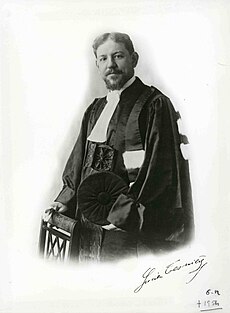Lucien Tesnière
| Lucien Tesnière | |
|---|---|
 |
|
| Born |
13 May 1893 Mont-Saint-Aignan, France |
| Died | 6 December 1954 (aged 61) Montpellier, France |
| Era | 20th century |
| School | Structuralism |
|
Main interests
|
Linguistics, syntax |
|
Notable ideas
|
Dependency (grammar), valency |
|
Influences
|
|
|
Influenced
|
|
Lucien Tesnière (French: [lysjɛ̃ tɛnjɛʁ]; May 13, 1893 – December 6, 1954) was a prominent and influential French linguist. He was born in Mont-Saint-Aignan on May 13, 1893. As a professor in Strasbourg (1924), and later in Montpellier (1937), he published many papers and books on Slavic languages. However, his importance in the history of linguistics is based mainly on his development of an approach to the syntax of natural languages that would become known as dependency grammar. He presented his theory in his book Éléments de syntaxe structurale (Elements of Structural Syntax), published posthumously in 1959. In the book he proposes a sophisticated formalization of syntactic structures, supported by many examples from a diversity of languages. Tesnière died in Montpellier on December 6, 1954.
Many central concepts that the modern study of syntax takes for granted were developed and presented in Tesnière's book (i.e. in the Éléments). For instance, Tesnière developed the concept of valency in detail, and the primary distinction between arguments (actants) and adjuncts (circumstants, French circonstants), which most if not all theories of syntax now acknowledge and build on, was central to Tesnière's understanding. Tesnière also argued vehemently that syntax is autonomous from morphology and semantics. This stance is similar to generative grammar, which takes syntax to be a separate component of the human faculty for language.
Lucien Tesnière was born on May 13, 1893 in Mont-Saint-Aignan, now a suburb of Rouen (north-west of France). He studied Latin, Greek, and German in school. He spent time abroad as a young man in England, Germany, and Italy. He was enrolled at the University of Sorbonne and the University of Leipzig studying Germanic languages when World War I broke out. He was mobilized on August 12 and sent to the front on October 15th. He became a prisoner of war on the 16th of February 1915. He was interned in the camp at Merseburg with 4000 other prisoners from all nationalities. During his 40 months of captivity, he continued his intense study of languages. He also worked for the German authorities as a French-English-Russian-Italian-German interpreter.
...
Wikipedia
